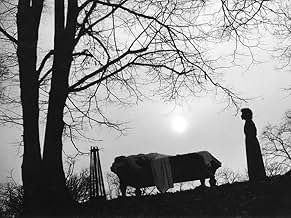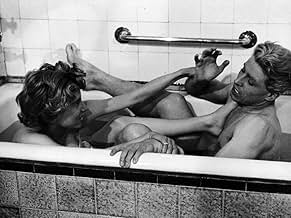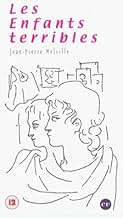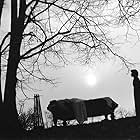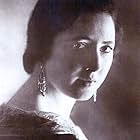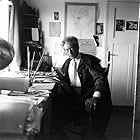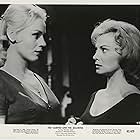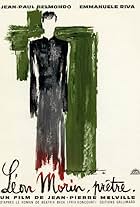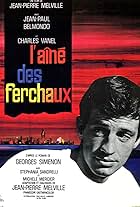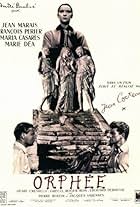IMDb RATING
6.9/10
4.4K
YOUR RATING
The dangerously obsessive relationship between a psychologically manipulative brother and sister who isolate themselves and draw others into their mind games.The dangerously obsessive relationship between a psychologically manipulative brother and sister who isolate themselves and draw others into their mind games.The dangerously obsessive relationship between a psychologically manipulative brother and sister who isolate themselves and draw others into their mind games.
- Nominated for 1 BAFTA Award
- 2 nominations total
Jean Cocteau
- Narrator
- (voice)
Karin Lannby
- The Mother
- (as Maria Cyliakus)
Storyline
Did you know
- TriviaJean Cocteau was allowed a day of shooting, when Jean-Pierre Melville wasn't feeling up to the mark. Cocteau was to follow Melville's instructions exactly or do nothing at all. Eight shots in all, which were supposed to be of a summer's day but were done in midwinter in the rain.
- GoofsThe amount of blood on Paul's face changes between when he is in the shop and when he is in the taxi.
- Alternate versionsThe song that Michael sings while sitting at the piano was deleted for the original American release.
- ConnectionsEdited into Histoire(s) du cinéma: Une vague nouvelle (1999)
- SoundtracksConcerto in A minor for 2 violins and string orchestra (Opus 3, No. 8; RV 522)
Written by Antonio Vivaldi
Featured review
First, I have to admit that I nearly didn't write this comment at all. I read a rave review of Les Enfants Terribles by an earlier user and agreed with (almost) every word of it. What more was there to add? Then I searched my soul for a day or so, and had to admit that this film REALLY does not work for me - brilliantly directed, skilfully acted, moodily photographed and lyrically scored though it may be.
For all its many splendours, this Melville film of a Cocteau novel suffers from a malady I can only describe as "creative schizophrenia." It is recognisably a work by two highly individual artists, each of whom creates his own distinctive and magical world. No film by Melville could ever be mistaken for anybody else's. The same is true of Cocteau.
How do these two worlds mix together? To put it bluntly, not at all. This is most apparent in the (mis)casting of the androgynous and incestuous brother-sister duo. With his porcelain cheekbones and languid sensuality, Edouard Dhermitte is a classic Cocteau actor. (He was, in fact, Cocteau's lover at the time.) With her politicised Left Bank angst and 'butch' vitality, Nicole Stephane is a classic Melville heroine. (She had starred in his much finer 1947 film Le Silence de la Mer.) These two actors scarcely seem to belong on the same planet, let alone in the same family.
Still more disheartening is the utter lack of allure of Renee Cosima, a pudgy young ingenue who is cast as the brother's two ambisexual love objects - the sadistic schoolboy Dargelos and the lovelorn model Agathe. Lacking even the tiniest flicker of charisma, whether as a man or as a woman, Cosima makes it difficult for us to empathise with the hero's erotic longings, or to care much about the hothouse melodrama that breaks loose as a result.
Try as I might to warm to this film, I cannot help imagining it with a different cast. As the brother and sister, Helmut Berger and Dominique Sanda from The Garden of the Finzi Continis. As the androgynous sexual pirate Agathe/Dargelos, maybe Katharine Hepburn from Sylvia Scarlett or Indrid Thulin from The Magician or (why not?) the immortal Anne Carlisle from Liquid Sky. Most important of all - and I know this smacks of heresy - I would much rather Cocteau had directed it himself. One great auteur should be enough for any film.
David Melville
For all its many splendours, this Melville film of a Cocteau novel suffers from a malady I can only describe as "creative schizophrenia." It is recognisably a work by two highly individual artists, each of whom creates his own distinctive and magical world. No film by Melville could ever be mistaken for anybody else's. The same is true of Cocteau.
How do these two worlds mix together? To put it bluntly, not at all. This is most apparent in the (mis)casting of the androgynous and incestuous brother-sister duo. With his porcelain cheekbones and languid sensuality, Edouard Dhermitte is a classic Cocteau actor. (He was, in fact, Cocteau's lover at the time.) With her politicised Left Bank angst and 'butch' vitality, Nicole Stephane is a classic Melville heroine. (She had starred in his much finer 1947 film Le Silence de la Mer.) These two actors scarcely seem to belong on the same planet, let alone in the same family.
Still more disheartening is the utter lack of allure of Renee Cosima, a pudgy young ingenue who is cast as the brother's two ambisexual love objects - the sadistic schoolboy Dargelos and the lovelorn model Agathe. Lacking even the tiniest flicker of charisma, whether as a man or as a woman, Cosima makes it difficult for us to empathise with the hero's erotic longings, or to care much about the hothouse melodrama that breaks loose as a result.
Try as I might to warm to this film, I cannot help imagining it with a different cast. As the brother and sister, Helmut Berger and Dominique Sanda from The Garden of the Finzi Continis. As the androgynous sexual pirate Agathe/Dargelos, maybe Katharine Hepburn from Sylvia Scarlett or Indrid Thulin from The Magician or (why not?) the immortal Anne Carlisle from Liquid Sky. Most important of all - and I know this smacks of heresy - I would much rather Cocteau had directed it himself. One great auteur should be enough for any film.
David Melville
- How long is The Terrible Children?Powered by Alexa
Details
- Release date
- Country of origin
- Official sites
- Languages
- Also known as
- Nesnosna deca
- Filming locations
- Production company
- See more company credits at IMDbPro
- Runtime1 hour 45 minutes
- Color
- Aspect ratio
- 1.37 : 1
Contribute to this page
Suggest an edit or add missing content

Top Gap
By what name was The Terrible Children (1950) officially released in Canada in English?
Answer
